Sales management is the process that entails developing new selling strategies, gathering and training sales teams, and coordinating the practices aimed at pursuing a company’s sales goals. It helps businesses create excellent sales teams, develop good consumer relationships, reduce costs, and reach sales targets.
In the video below, Alex shares killer sales management tips for your marketing success. Check it out!
In this article, we’ll unveil the importance and objectives of sales management. We’ll also explore functions, key principles, best software, and strategies.
Why is sales management important?
An effective sales management process is a must-have for any company. It helps you reach your sales objectives, control sales processes, close deals faster, boost sales performance, and thrive in a highly competitive environment. It also plays a significant role in optimizing lead qualification. With planning, coordination, and control, a salesperson can ensure the quality of their sales process and help a company scale.
With sales management, companies reduce costs associated with distributing their products and receive high profits. The process enables business owners to improve communication among their team members, build relationships with prospects and customers, effectively introduce new products, and increase the production of goods that are in great demand among consumers.
Now that you know why sales management is important, let’s proceed to the next section with sales management objectives.
Sales Management Objectives
Each company sets business aims it wants to achieve within a specific time. Although all businesses develop in their own way and, in theory, set different goals, most of them are often very similar.
The objectives can be divided into short-term and long-term goals. In the group of short-term goals, we can identify retaining and capturing market share and defining sales volume to make a business profitable. Objectives that need to be implemented over a long time include retaining a certain percentage of customers, assisting in training sales representatives, supporting sales teams with technical advice, and tracking, collecting, and analyzing any sales information.
As you see, the sales objectives of all businesses are pretty similar. Now that you know them, let’s walk you through their functions.
Functions of Sales Management
Sales management goes beyond just overseeing sales and ensuring customer satisfaction. At its core, it involves empowering sales reps to perform at their best, setting clear targets, and optimizing the sales process for maximum efficiency. Let’s explore its key functions in more detail.
- Setting targets. Establishing unrealistic goals can harm your business. To drive success, it's crucial to set achievable, realistic targets. Use your sales team's reports to identify attainable goals based on current data. However, remember that past performance doesn't always predict future customer behavior.
- Identifying quality leads. There are often many potential customers seeking information about your product. Your role is to ensure that your sales team can quickly identify and engage with high-quality leads. Equip them with the tools and strategies to tailor their approach to each prospect, maximizing the chances of conversion.
- Improving your sales process efficiency. While identifying high-quality leads is a key part of optimizing your sales process, it's equally important to streamline the overall efficiency and speed. Implementing a software solution can help assign tasks to team members with specialized knowledge, ensuring the right person handles each stage of the process. For example, when a prospect shows interest on your website, it's best to assign them to a sales rep with in-depth product knowledge, starting with the basics. Additionally, using email campaigns to engage leads and clients can foster trust and build long-term relationships.
- Monitoring the performance of your salespeople. To see the progress in your team’s work, you need to track your salespeople’s performance and the value they bring. It’s a good idea to encourage your team members with rewards for a well-done job. For underperformers, you can prepare some additional training to master their skills.
- Analyzing the reports. Reports are essential for gathering insights and making informed decisions. Use the data to assign tasks effectively and set short-term objectives for your sales teams. Additionally, analyze the reports to identify any obstacles that may be preventing your company from reaching its goals.
Now that you are aware of the functions, we need to explore the fundamentals of sales management.
Key Principles of Sales Management
Sales managers act according to the targets entrepreneurs set. To achieve these goals, your sales team should comply with the following principles.
- Consistency. The success of the sales process hinges on several factors, with consistency being one of the most crucial. While achieving consistency can be challenging, it’s well worth investing time and effort. Consistent practices help close deals more efficiently, build stronger customer relationships, and boost sales performance. Ensure your sales team receives clear guidelines for each stage of the sales funnel, provide training on effective customer interactions, and regularly review reports to monitor progress.
- A degree of independence. For sure, a sales manager can’t do everything alone. You can give your team a chance to do some tasks independently and track the results. Consider giving some extra tasks to your top performers and rewarding them for closing the deals. This approach not only shows trust in their abilities but also motivates the entire team to strive for better results.
- Equality among the members of your team. It’s essential to treat every member of your team with equal respect and fairness. Avoid placing some salespeople above others or offering preferential treatment. Instead, focus on adjusting sales targets and performance standards to suit each individual’s capabilities and development needs.
- Conviction. Being a sales representative is challenging. It requires understanding customers' needs based on their communication and crafting persuasive arguments to encourage them to purchase. Salespeople often face criticism, counterarguments, and negative feedback. To handle objections effectively and improve customer retention, your sales team should enhance communication skills, build confidence, and possess deep product knowledge.
Now that you know the main sales management principles, it’s time to find out how to bring them to life. Let’s explore the best software.
10 Best Sales Management Software
- SendPulse
- Pipedrive
- Zoho CRM
- ActiveCampaign
- HubSpot
- Freshsales
- Zendesk
- Omnisend
- Constant Contact
- Insightly
Sales management tools vary depending on the tasks they help streamline. Some allow you to improve team productivity, while others keep all the data in a centralized system so that every sales representative can understand each customer’s needs, pain points, and the stage in the buyer’s journey. Here are the top 10 sales management software solutions that help you optimize processes related to communication with potential clients and existing customers.
SendPulse
SendPulse is a versatile marketing platform that combines CRM, an email marketing service, a chatbot builder, a live chat creator, and many other tools crucial for seamless communication with customers and successful sales. The service is a great fit for companies seeking to manage their customer data properly, ensuring meaningful interactions with their audiences and more conversions.
Its CRM helps you set sales and communication with customers on autopilot. With SendPulse, you can accept orders, gather customer data in one place, run marketing campaigns, and ensure that your teams can access a comprehensive database. Moreover, it allows you to assign deals to specific sales agents seamlessly. To contact these customers, your agents need to open a specific deal and connect with them using email or chat on Facebook Messenger, Telegram, or WhatsApp. It depends on how these clients first contacted you.
Below, you can see how to create a deal using SendPulse’s CRM. It lets you choose the status, set a due date and deal type, and add the necessary files.
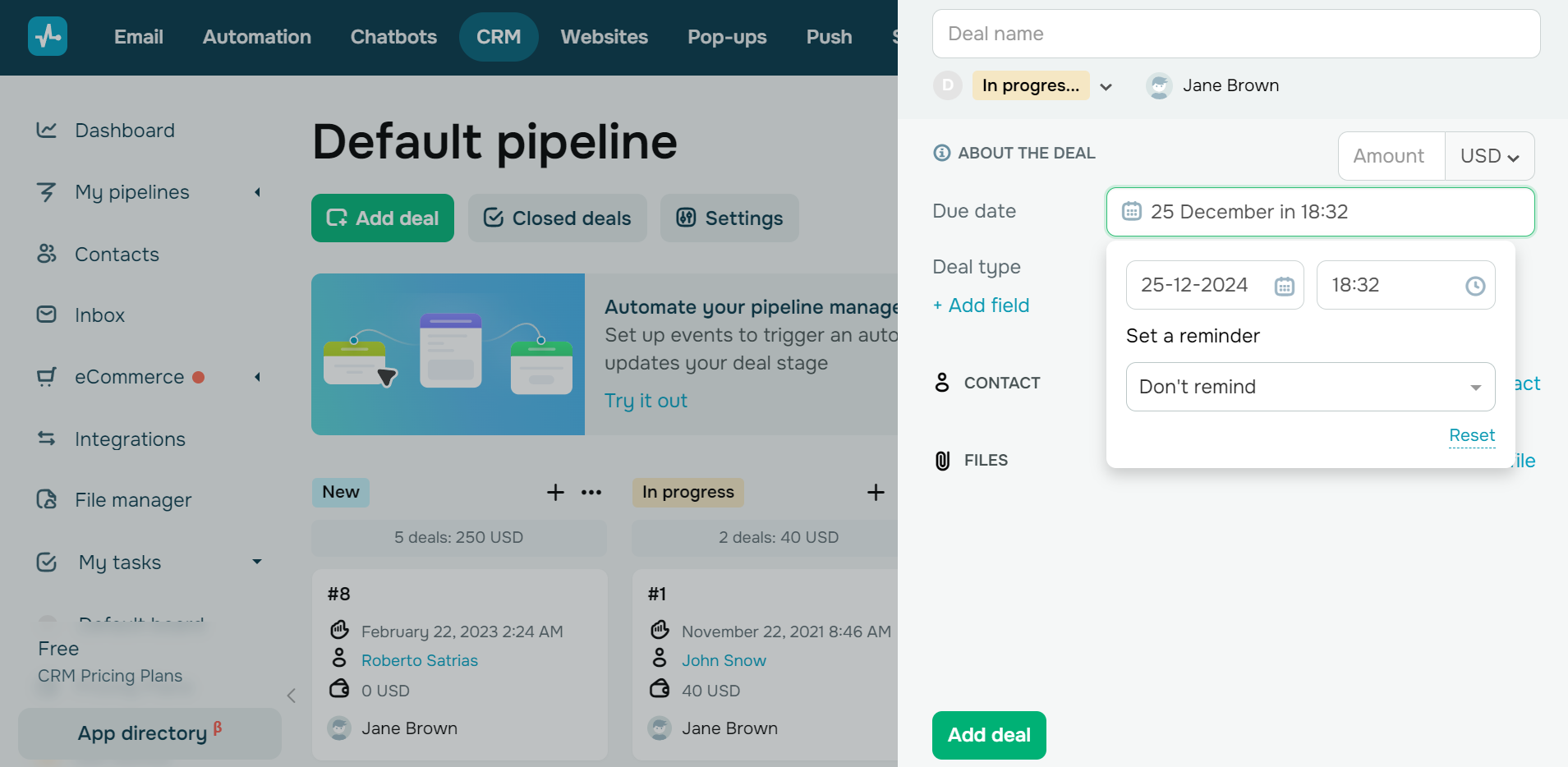
Pricing: You can access the CRM for free. A free plan allows you to create 2 sales pipelines, and 2 boards, add 5 flows, 1 event, and 50 elements in Automation 360. To have fewer limitations, you’ll need to upgrade to a paid plan, which starts at $6,80 monthly if paid annually. It includes 1 user per account, 2 sales pipelines, 8 flows, 5 events, 50 elements in Automation 360, 2 boards, 3 GB of file storage, and unlimited task templates.
Pipedrive
Pipedrive uses AI to manage deals and automate the sales process. Its visual Kanban dashboard lets you track ongoing deals and their respective stages, allowing your sales team to prioritize customers based on their progress.
The service enables you to import data from spreadsheets in a couple of minutes and start chats with customers right from the CRM. You can also check the history of conversations with each customer to better understand their needs, requirements, and pain points. The platform allows you to follow up with automated sales conversations and AI-powered prompts to identify and prioritize qualified prospects.
Below is a Kanban dashboard with deals and their statuses added to Pipedrive.
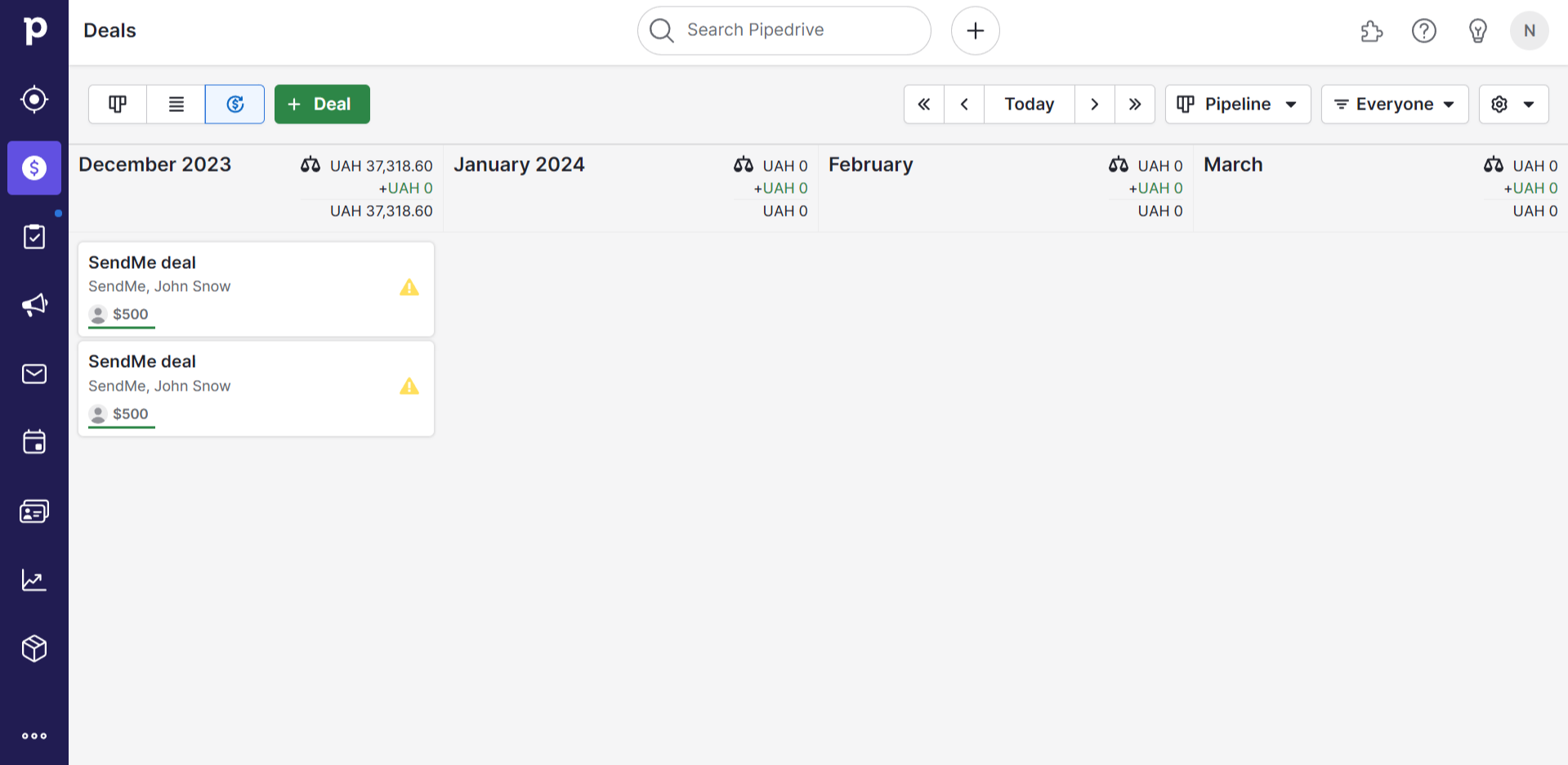
Pricing: Pipedrive offers a 14-day free trial, enabling you to access its CRM. Once it ends, you should buy a paid plan starting at $13.69 per user monthly, billed annually. It covers lead and deal management, customizable pipelines, a products catalog, leads inbox, and more.
Zoho CRM
Zoho CRM is a platform that provides your sales reps and sales leaders with a CRM to help manage deals, store contacts, delegate tasks, and analyze results. The service offers a wide range of features to convert leads into customers. One of these is sales forecasting supported by AI. It allows you to identify the status of each deal, disqualify bad leads, and focus on closing deals with the most probable prospects. With advanced filters, you can easily sort records with similar patterns, scores, or activities to find the most likely to purchase.
Additionally, the platform has a sales management feature that helps prioritize and monitor deals in your pipeline. It ensures that your sales reps focus on the right deals, analyze deal histories, tailor sales processes based on your requirements, and build customized pipelines for better efficiency and productivity.
Below, you can see the dashboard with deals in Zoho CRM.
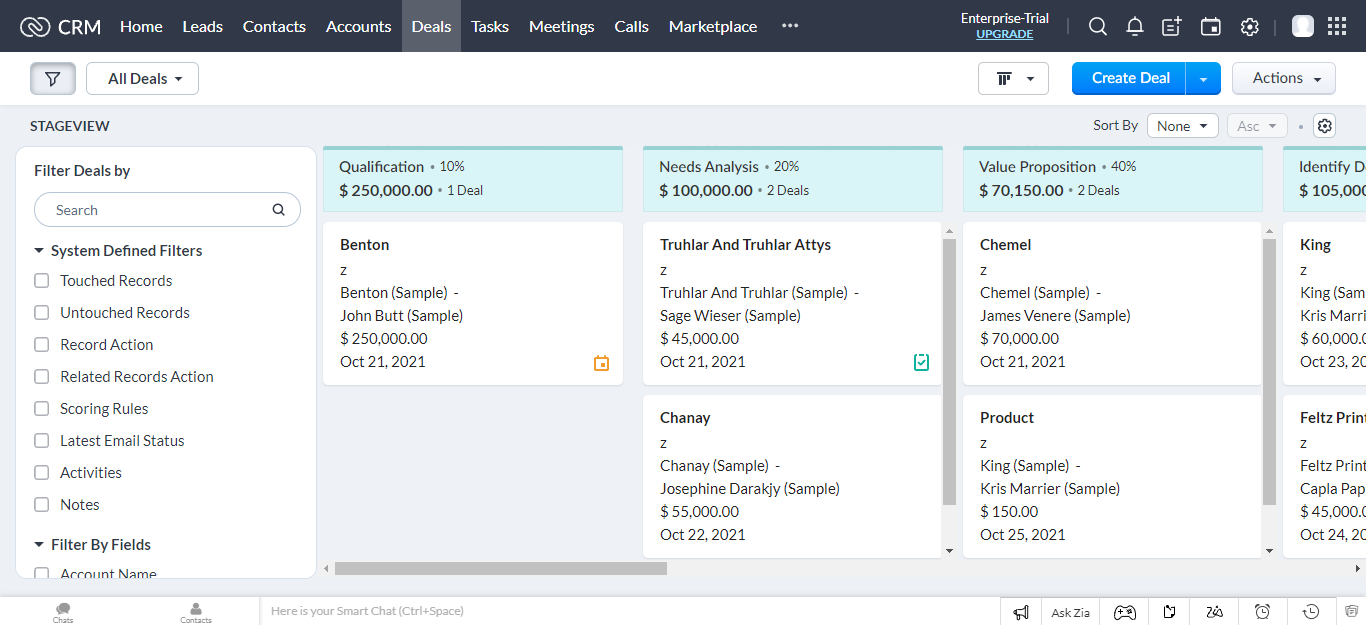
Pricing: The service has a 15-day free trial to determine whether it suits your needs. After that, you can choose one of the paid plans. The cheapest will cost you $14,60 per user monthly if paid annually for mass email, custom fields, workflows, sales forecasting, custom reports, and more.
ActiveCampaign
ActiveCampaign is a multichannel solution that enables you to deliver relevant email campaigns, send messages on autopilot, add new deals to your CRM, and build high-converting landing pages. With its help, you can manage all the sales processes from one place. It is a good choice for SaaS and technology companies, healthcare, eCommerce, education, and other businesses.
Its marketing automation allows you to personalize your interactions with customers based on insights from your CRM. Moreover, since automation is powered by AI, you can set your goals, and AI will help you achieve them. With predictive sending, your messages will always be relevant and on time. The system delivers email campaigns to subscribers when they are most likely to notice and open them.
Below, you will find one of the platform’s templates for upselling after purchase automation.
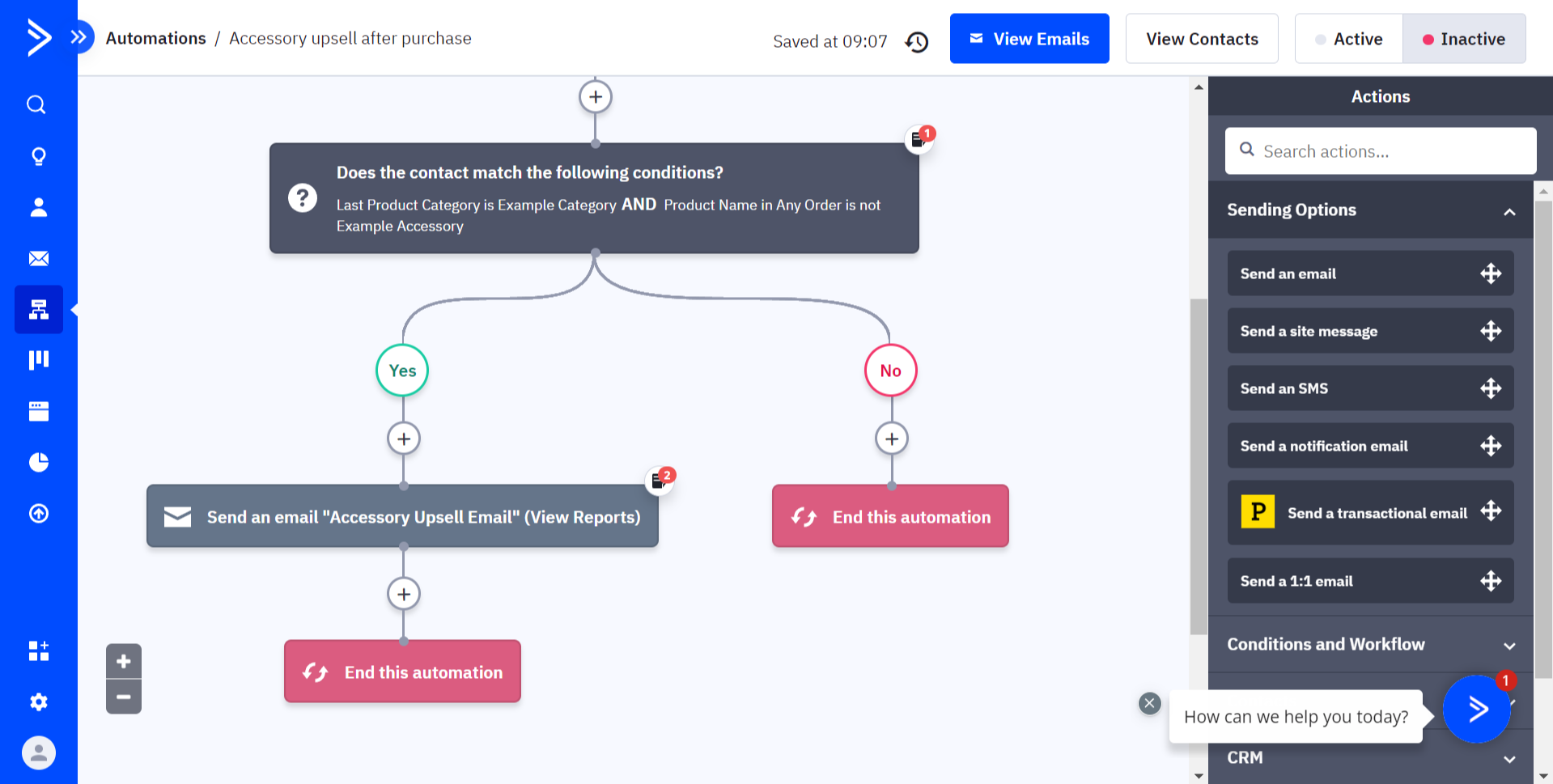
Pricing: ActiveCampaign has a 14-day free trial. In addition, the platform offers paid plans that start at $15 monthly and cover 1,000 contacts, 1 user, multi-step marketing automation with 5 actions per automation, email templates, and more.
HubSpot
HubSpot is another omnichannel marketing software that offers various channels for boosting sales, including marketing automation, CRM, and email marketing services. Businesses of all types and sizes can take advantage of the platform to attract new customers more effectively.
The platform’s sales software allows you to create high-quality sales pipelines to ensure more meaningful conversations with prospects. Personalized email templates, automated follow-ups, and A/B testing allow you to create messages tailored to each potential client, encouraging more conversions. Moreover, its AI-supported sales email generator ensures your messaging resonates with prospective customers.
Below, you can see HubSpot’s CRM with deals and their statuses.
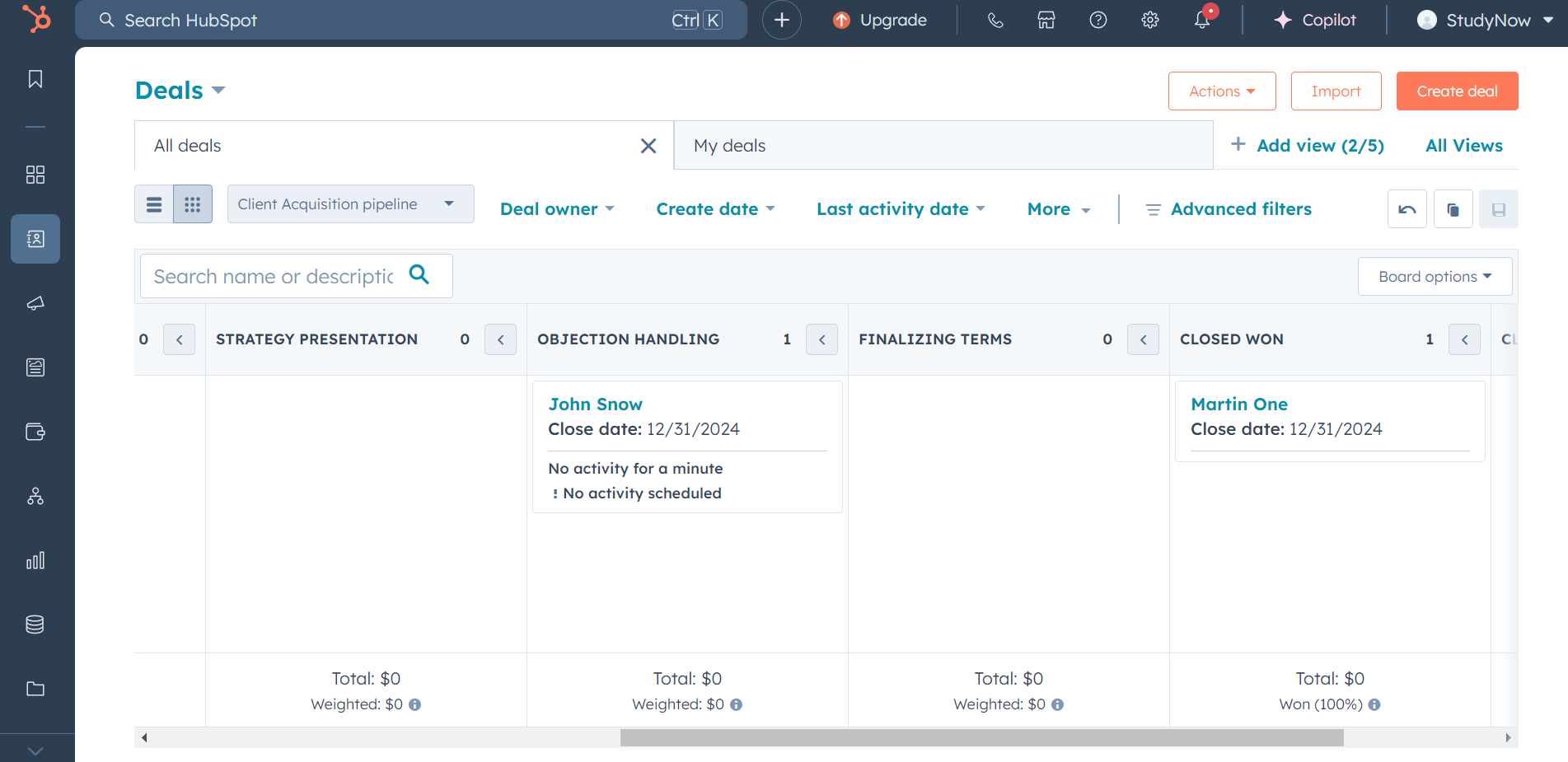
Pricing: The service is free, meaning that you can access its main solutions just after signing up. If you need more features for your sales bundle, you’ll need to buy a paid plan. It will cost you $12.52 monthly when billed annually for one seat, conversation routing, simple automation, repeating tasks and task queues, lead generation tool, and more.
Freshsales
Freshsales is a CRM software that helps businesses attract more potential customers, close more deals, and improve productivity. With the platform’s Freddy AI, you can run smart sales campaigns, generate more qualified prospects, delegate deals to specific sales reps, and monitor their progress. You’ll be able to do this seamlessly while using this intuitive platform with Kanban dashboards, drag-and-drop cards, and a simple interface.
Since Freshsales is powered by AI, it allows you to understand your audience, focus on their preferred channels, and have engaging conversations. It also helps prioritize valuable prospects who are likely to convert.
Below, you can see the Freshsales dashboard with deals.
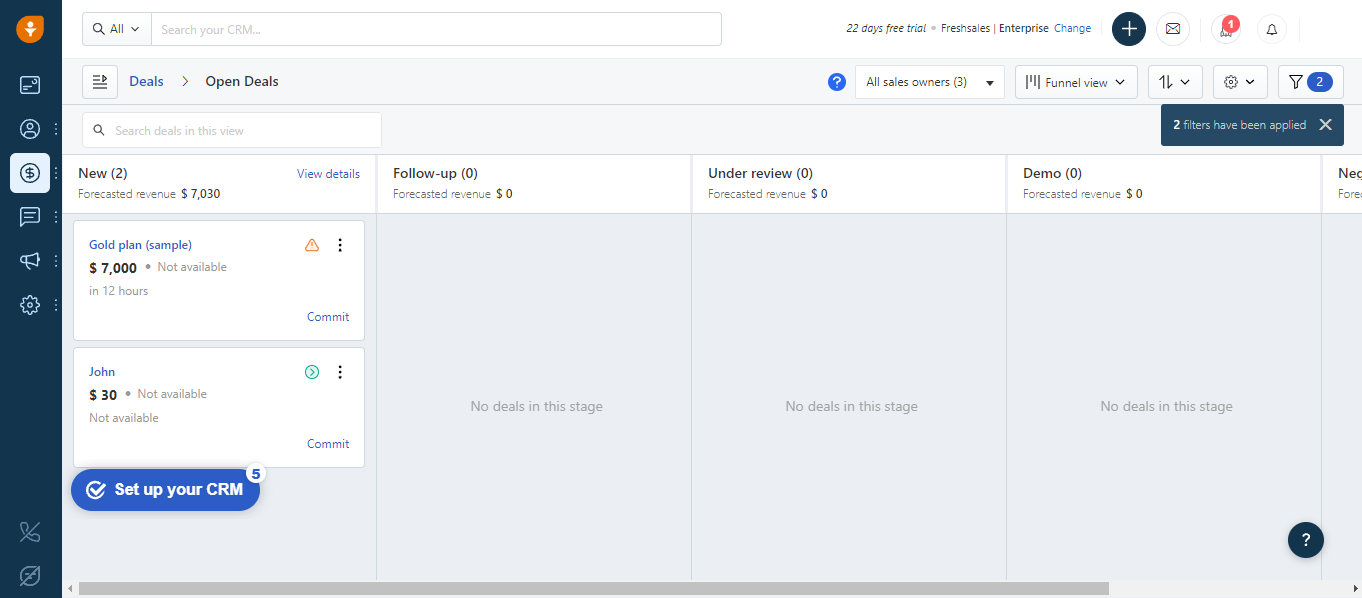
Pricing: The platform doesn’t offer a free plan, but you’ll still have a 21-day free trial to determine whether it suits your needs. If you are sure that it’s a great choice, you can start with a paid plan for $9 per user monthly if paid annually. It includes a Kanban view for contacts, accounts, and deals, contact lifecycle stages, built-in chat, email, and phone, email templates, custom fields, basic workflows, and more.
Zendesk
Zendesk is a marketing solution with all the necessary tools and features for excellent sales and customer service. Regardless of your business size and industry, you’ll be able to provide an exceptional customer experience, which will result in more sales. The platform is powered by AI, which allows you to send relevant and timely messages using live chat, messengers, and social media channels.
The service’s main feature is personalization. By ensuring interactions tailored to your potential customers’ needs, there’s a higher chance of them getting interested and completing a purchase. To have meaningful chats with customers, you need to have a clear understanding of their needs, preferences, pain points, and buying history. For this purpose, you can take advantage of Zendesk’s CRM. It has contact and deal management, activity tracking, and lead generation features. Additionally, you can set up triggers and run tasks on autopilot to keep your sales team focused.
Below, you will find Zendesk’s CRM with deals.
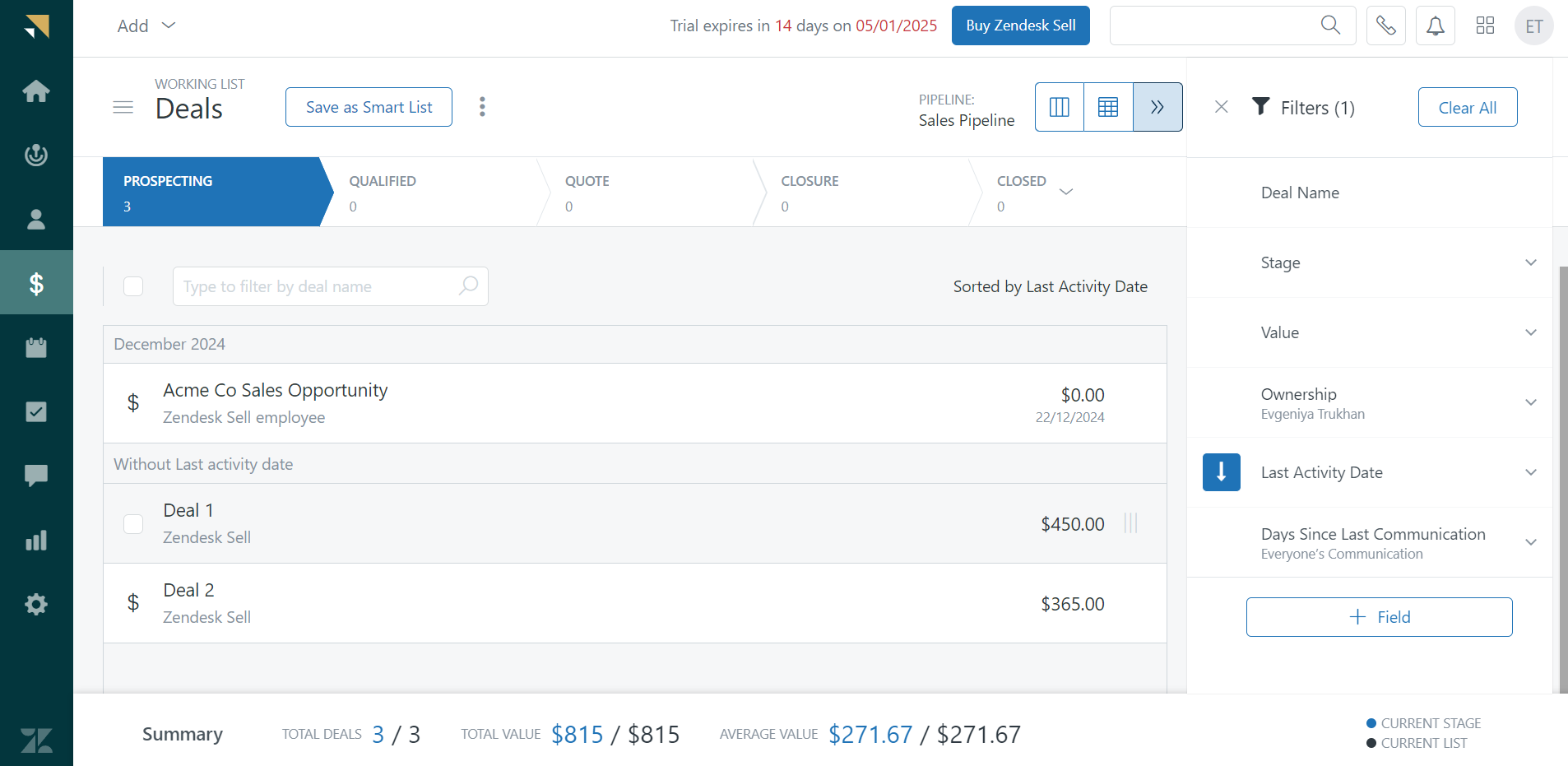
Pricing: The platform offers a 14-day free trial. If billed annually, the price for its CRM starts at $19 per user monthly. This plan provides access to two customizable sales pipelines, email and calendar integrations, task and appointment settings, call tracking and recording, text messages, and pre-built sales dashboards.
Omnisend
Omnisend offers many sales-related services, including email, SMS, web push notifications, and marketing automation services. With its help, you can communicate with prospects and encourage them to convert through personalized email campaigns, web push notifications tailored to their needs, and automated messages with product recommendations. The platform also has robust analytics, allowing you to obtain sales reports and determine which channels bring the most revenue.
Omnisend's drag-and-drop builder enables you to create campaigns with dynamic content blocks designed for e-commerce businesses. The service’s Product Picker allows you to add products to your emails right from your store, and discount codes will reward your subscribers. With the service, you can generate more repeat customers by suggesting relevant best-selling items.
Below, you can see Omnisend’s intuitive email creator. This tool allows you to build an email campaign from a ready-to-go template.
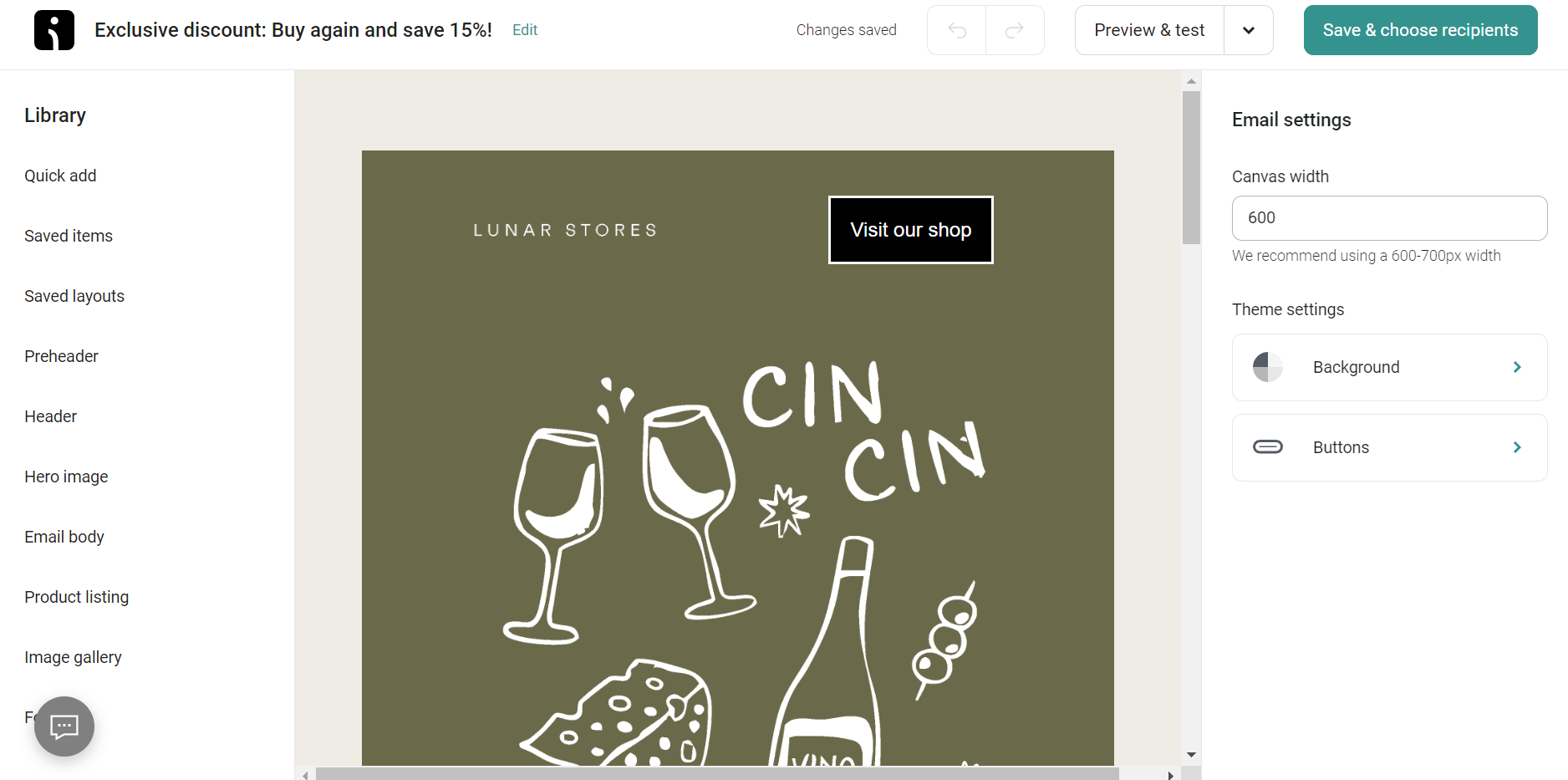
Pricing: Omnisend has a free plan with 250 contacts, 500 emails, and 500 web push notifications monthly. If you want to have fewer limitations, you can purchase a paid subscription for $16 monthly, which provides 500 contacts, 6,000 emails, and unlimited web push notifications.
Constant Contact
Constant Contact combines email, SMS, CRM, social media marketing, and automation. It will be a good fit for businesses of all sizes and various industries, including education, healthcare, e-commerce, SaaS, and more. Its reporting capabilities will help you identify the right channels and strategies for even better sales.
The platform’s marketing automation is fully integrated with a cloud-based CRM to establish strong relationships with and convert your target audience. Constant Contact allows you to conduct lead scoring to identify prospects who are very likely to become customers. It also helps you prioritize individuals based on their interests.
Below, you can see a welcome SMS flow that you can create using Constant Contact.
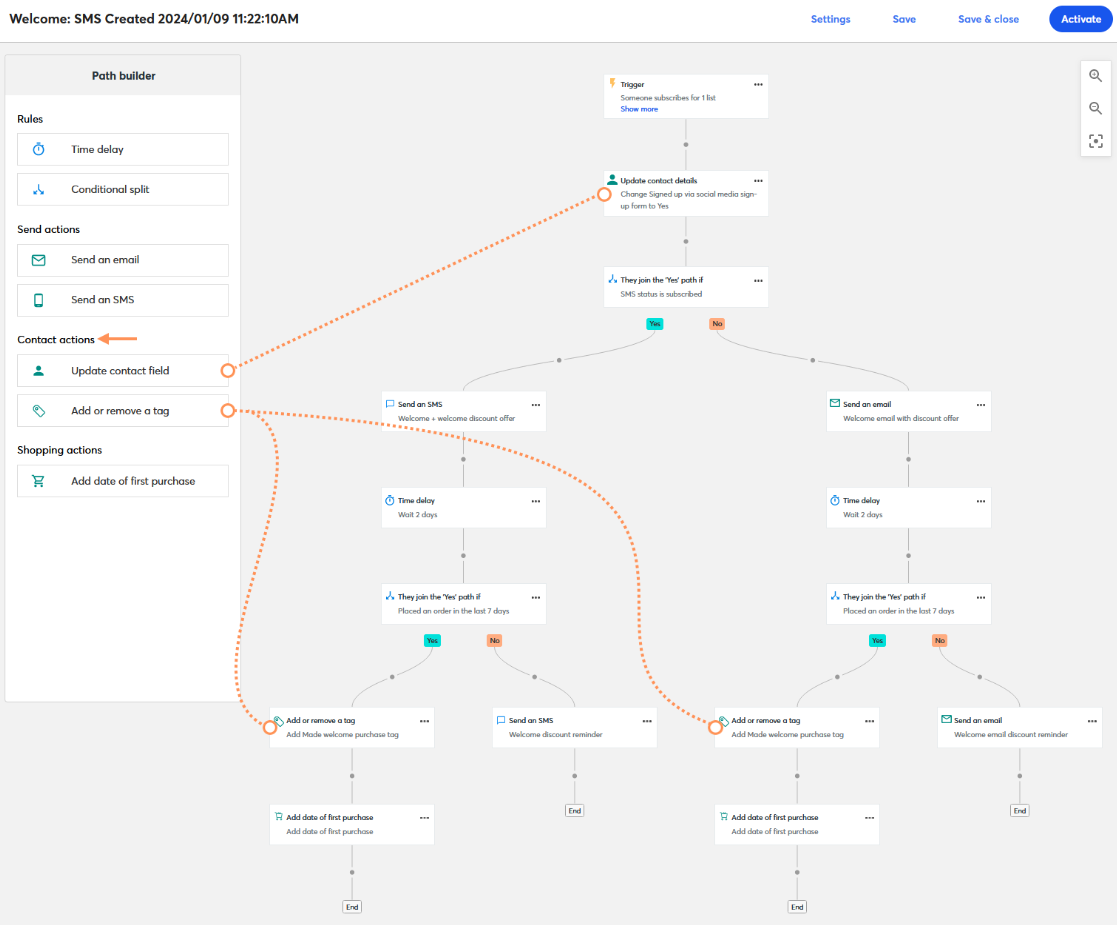
Pricing: The software offers a 14-day free trial. However, if you want to use its 3 automation templates, resend emails to non-openers, manage contacts, and more, you can choose one of the paid plans starting at $35 monthly.
Insightly
Insightly is a customer relationship management software that covers pipeline management, lead tracking, opportunity management, workflow automation, and project management. The service will help you securely store customer data, successfully close deals, and improve team productivity smoothly.
With Insightly’s CRM, you can capture prospects’ contact information, focus on qualified leads, and delegate tasks based on your team members’ responsibilities. It also helps your sales reps have a real-time view of each potential customer and discover what these individuals like and which stage of the buyer’s journey they have already entered. Moreover, the platform’s automation helps you reduce the workload on your team and prevent human error by automating specific repetitive tasks. Messages with reminders, onboarding, and discounts on autopilot will be delivered on time without human involvement.
Below, you can see how to add a new deal to your Insightly CRM in minutes.
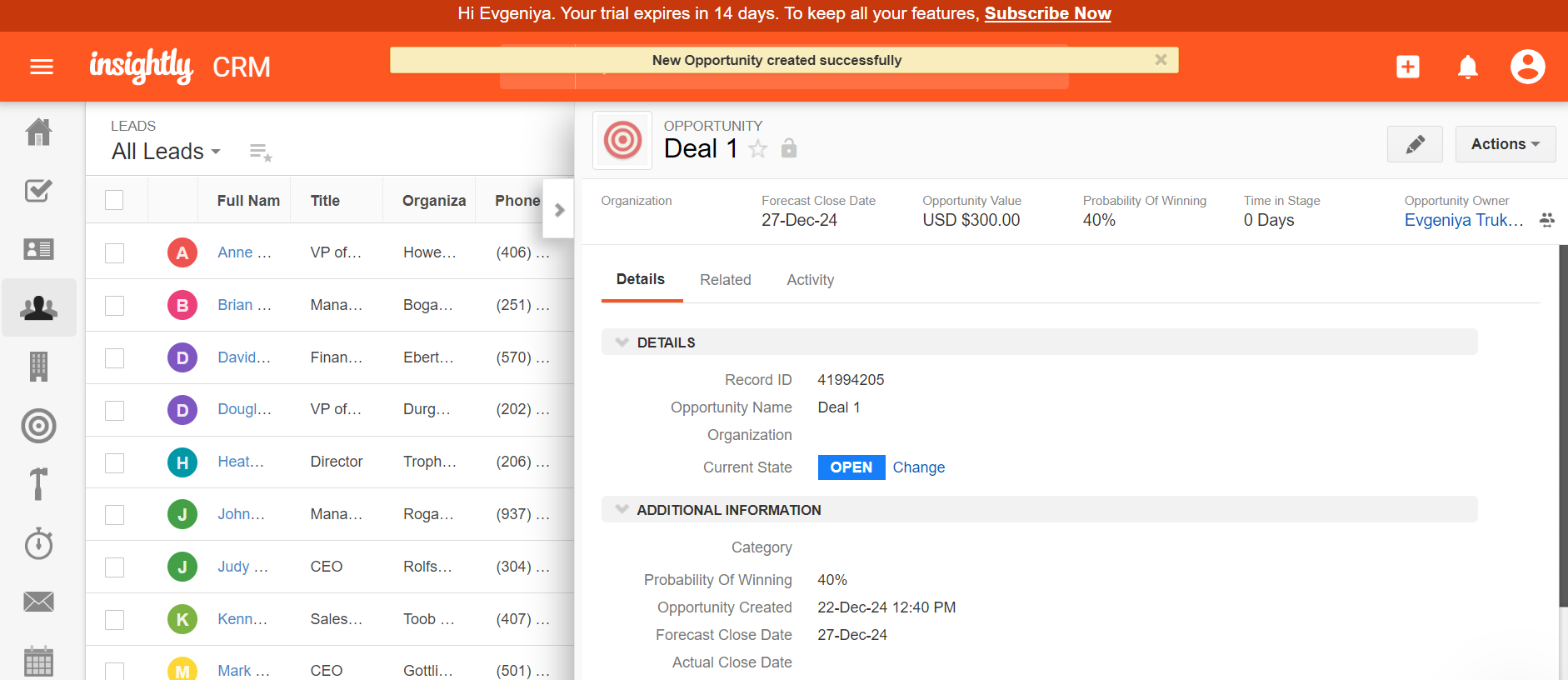
Pricing: The service offers a 14-day free trial and paid plans based on the channels you prefer to use. To access its CRM, you’ll need to pay $29 per user monthly for lead and contact management, project management, advanced reports, and pre-built business dashboards.
Now that you have a list of platforms to choose from, it’s time to proceed to the strategies. They will help you maximize your efforts and grow your business.
10 Sales Management Strategies
- Set achievable goals
- Find the right people for your team
- Educate your salespeople and give feedback
- Use special tools
- Encourage healthy competition
- Develop individual sales plans
- Reward your top performers
- Measure the progress of your team
- Adapt to market trends
- Take advantage of analytics
An effective strategy that involves modern techniques and a professional sales team can work wonders for your company’s ROI. Read on if you are interested in making your business grow and prosper.
- Set achievable goals. Sales managers sometimes focus too heavily on a company's targets without fully considering their sales teams' capabilities and performance. This can lead to unrealistic goals that, when pursued, result in failure. Sales teams may struggle to meet these overly ambitious objectives, which can demotivate them and jeopardize overall performance. To avoid this, base your goals on the average performance of your sales reps, ensuring they are challenging yet achievable.
- Find the right people for your team. To continue scaling, it’s crucial to attract the right talent for your sales team. With the right candidates, you can build a successful team that drives your company’s growth. Before creating a job description and interviewing candidates, define your company’s specific needs. Different types of salespeople are required for different purposes, so it’s important to understand why you need a new employee. Next, develop a clear, step-by-step interview process to select the most suitable applicants. Finally, involve your colleagues in the hiring process to identify the qualities and skills they believe are essential for success in the role.
- Educate your salespeople and give feedback. As a sales manager, you need to always be in touch with your sales team. Your new hires should work under your guidance to absorb the sales process, learn how to handle objections, and understand where to find prospective customers. With time, your new employees can handle the necessary tools and obtain experience and knowledge in sales, tricks, and strategies. Ensure to provide an effective training process to turn people with potential into top performers. Remember to give feedback after your salespeople complete certain tasks.
- Use special tools. Many platforms can help you optimize your sales process and centralize all the customer data in one place. A CRM system enables you to manage customer data seamlessly, provides sales agents with actionable insights, and ensures proper communication between teams and agents. With its help, you can be sure that every agent is aware of the customer journey stage, preferred communication channels, pain points, and needs. This way, your sales representatives develop relevant offers that resonate with customers’ needs. Besides, to smoothly handle repetitive communication with clients, you can use automation. It will help you deliver email campaigns for various purposes and reduce the workload on your team. You can choose a platform like SendPulse that combines CRM, automation, chatbots, and other valuable marketing tools to elaborate meaningful sales processes.
- Encourage healthy competition. You can encourage more sales by providing your sales reps with incentives. Competition is always good when healthy because it allows you to attain your business goals faster. When you reward your sales agents with some bonuses, you motionate to search for more effective ways to promote your products and sell them.
- Develop individual sales plans. Consider creating sales plans for each of your sales teams, including their goals. By adapting to each of your sales reps, you can show them that you pay attention to their experiences and skills. This approach allows you to set realistic goals for each sales agent and lets them work based on their competence.
- Reward your top performers. Salespeople who do their job perfectly want to receive cash incentives from the company and get praise. That’s why it’s worth creating a plan that involves specific targets and monetary compensations for them. As a sales manager, you need to ensure that you do everything possible to retain customers and lure new ones.
- Measure the progress of your team. It’s critical to monitor and evaluate the progress of your team. You need to determine whether your company succeeds in growing or if there is something that slows down this process. Identify the reasons and try to eliminate them by reviewing the work of your sales team and improving your strategies. Besides, you should ask your sales representatives to create manual lists and reports, so consider designing a reporting process in your CRM to simplify your work.
- Adapt to market trends. When developing a sales strategy, you should always research competitors and adjust to market trends. By doing so, you’ll be able to discover more effective ways to reach your potential customers and encourage them to purchase your products. You should also teach your team members innovative sales techniques, invite them to join special training sessions and provide them with workshops to practice their skills.
- Take advantage of analytics. After implementing specific sales strategies with your team, always check how they work. By using analytics, you’ll be able to identify those approaches that convert more people into customers. It can also provide information on areas that need your close attention. Monitoring essential metrics like conversion rates, win rates, average deal size, and sales cycle length allows you to make well-informed decisions regarding the next steps in your sales process. You can adjust your strategy so that it yields better results.
Overall, effective sales management, combined with the right tools, can help your business reach goals related to conversions and revenue. Since this process depends heavily on the competence of your sales team, you must provide them with all the necessary support, training, knowledge, and skills. Tools like CRM and marketing automation will simplify their work and ensure that all data is centralized and all processes are streamlined.

or